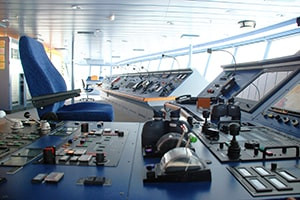Electronics is the science and technology concerned with regulating the flow of electrical current. Put simply, it lets you move electrons around. While this may not seem like too big of a deal, the regulation of electrons has enabled some of the most important innovations of the last century, including computers, televisions, rocket ships, electric cars, video games, smartphones and more. This science is also central to developing many industries like telecommunications, banking, logistics and maritime technology. Electronics has helped relevant players in maritime, mainly marine engineers, perform various activities related to designing, constructing, testing and maintaining marine vessels. It has aided big, small, complex or straightforward crafts and helped maintain offshore platforms for the docking of marine vessels. Marine electronics components ensure that the combination of different equipment used on board ships works correctly in conforming to national and international standards. The technology of electronics applies the theories behind the science and many principles in the design, production, installation, use and so on of electronics across industries, including commercial and industrial contexts. Combining the science and components of marine electronics is what enables crucial vessel and dock routine test standardisation.
The course covers the fundamentals of parameters and elements used to design complex tools for energy generation, distribution, storage, circuits and their networks and communications systems. We discuss the essential maritime electronic components, including resistors, batteries, semiconductors, capacitors and transistors. We will analyse the combined electronic components on board vessels and ships and cover elements of electric conductors like wires, semiconductors like diodes and insulating materials found in resistors. Discover the principal applications of different combinations of electronic components in making devices used in the maritime industry, ranging from radios, radars, decoders, multiplexers and even lighting systems. Investigate various aspects regarding marine electronics, including digital and combinational circuits that deal with logic gates. Other important maritime electronic factors identified under digital logic circuits include ‘flip flops’, algorithmic state machines and shift registers alongside combinational circuit elements based on adders, subtractors, encoders, decoders and read-only memory (ROM).
Our lives are increasingly dependent on logistics, with products moving from exports to imports, utilising complex maritime transport technologies supported by electronics. This course is a comprehensive study of the fundamental principles to advanced concepts of circuits and network elements, electrostatic-sensitive components, digital and combinational circuits, and the identification of unsafe practices, how to avoid them and stay protected from such dangerous situations. It aims to equip you with a complete overview of electronics consisting of basic electronic technology concepts to more advanced combinations of components for mariners and people involved in maritime fields. It will be of significant interest to students, researchers, marine engineers and anyone seeking to learn about marine electronics and maintenance procedures. So register for this course today to improve your understanding of marine electronics, their workings and their applications in relevant marine systems.
In This Free Course, You Will Learn How To
View All Learning Outcomes View Less All Alison courses are free to enrol study and complete. To successfully complete this course and become an Alison Graduate, you need to achieve 80% or higher in each course assessment. Once you have completed this course, you have the option to acquire an official Diploma, which is a great way to share your achievement with the world.
Your Alison is:
- Ideal for sharing with potential employers
- Include it in your CV, professional social media profiles and job applications.
- An indication of your commitment to continuously learn, upskill & achieve high results.
- An incentive for you to continue empowering yourself through lifelong learning.
Alison offers 3 types of Diplomas for completed Diploma courses:
- Digital : a downloadable in PDF format immediately available to you when you complete your purchase.
- : a physical version of your officially branded and security-marked , posted to you with FREE shipping.
- Framed : a physical version of your officially branded and security marked in a stylish frame, posted to you with FREE shipping.
All s are available to purchase through the Alison Shop. For more information on purchasing Alison , please visit our FAQs. If you decide not to purchase your Alison , you can still demonstrate your achievement by sharing your Learner Record or Learner Achievement Verification, both of which are accessible from your Account Settings. For more details on our pricing, please visit our Pricing Page











 Knowledge & Skills You Will Learn
Knowledge & Skills You Will Learn






